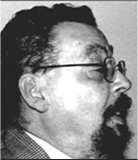
Germán Espinosa
Encyclopedia

Colombia
Colombia, officially the Republic of Colombia , is a unitary constitutional republic comprising thirty-two departments. The country is located in northwestern South America, bordered to the east by Venezuela and Brazil; to the south by Ecuador and Peru; to the north by the Caribbean Sea; to the...
n novelist, poet
Poet
A poet is a person who writes poetry. A poet's work can be literal, meaning that his work is derived from a specific event, or metaphorical, meaning that his work can take on many meanings and forms. Poets have existed since antiquity, in nearly all languages, and have produced works that vary...
and author
Author
An author is broadly defined as "the person who originates or gives existence to anything" and that authorship determines responsibility for what is created. Narrowly defined, an author is the originator of any written work.-Legal significance:...
born and based in Cartagena, Colombia
Cartagena, Colombia
Cartagena de Indias , is a large Caribbean beach resort city on the northern coast of Colombia in the Caribbean Coast Region and capital of Bolívar Department...
. He wrote over forty works over the course of his career. He often used his native Cartagena for the backdrop or inspiration for his writings. His historical fiction
Historical fiction
Historical fiction tells a story that is set in the past. That setting is usually real and drawn from history, and often contains actual historical persons, but the principal characters tend to be fictional...
writings featured such diverse topics as witches, pirates and the Spanish Inquisition
Spanish Inquisition
The Tribunal of the Holy Office of the Inquisition , commonly known as the Spanish Inquisition , was a tribunal established in 1480 by Catholic Monarchs Ferdinand II of Aragon and Isabella I of Castile. It was intended to maintain Catholic orthodoxy in their kingdoms, and to replace the Medieval...
.
Espinosa was often called "Gabo sin Nobel," or "Garcia Marquez without the prize" in English. The quote referred to fellow Colombian writer, Garcia Marquez, who won the Nobel Prize for Literature in 1982.
Espinosa was best known for his 1982 novel
Novel
A novel is a book of long narrative in literary prose. The genre has historical roots both in the fields of the medieval and early modern romance and in the tradition of the novella. The latter supplied the present generic term in the late 18th century....
"La Tejedora de Coronas" (The Weaver of Crowns). which focuses on the main character, Genoveva Alcocer, and is set in 17th century Cartagena.
Espinosa once called the city of Cartagena a "city of legends." "Perhaps the legends that arose in my city were the product of the inactivity of the people, since, for so long, almost the entire 19th century . . . there was nothing much to do other than invent, speak, read and remember."
His books are a real milestone for Colombian and American Literature. Some of his novels are "La Balada del Pajarillo" (the Ballad of the little bird), "Cuando Besan las Sombras" (When shadows kiss), "El Signo del Pez" (The Sign of the Fish) and "Aitana", dedicated to his deceased wife, Josefina. He also wrote several books of short stories.
Germán Espinosa died of cancer on October 17, 2007, in Cartagena at the age of 69.

